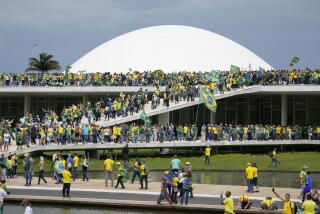Brazil arrests strike leaders to halt police work stoppage in Rio
- Share via
Reporting from Sao Paulo, Brazil — In an attempt to stop the spread of chaos throughout the country one week before Carnival, Brazil on Friday arrested leaders of a police strike in Rio de Janeiro before it got fully underway in that city.
Police officers demanding higher pay had already walked off the job in the northeastern state of Bahia, whose capital is Salvador, for 10 days, and about 150 people died in the ensuing criminal violence.
Authorities in both cities now claim the situation is under control, but the earlier turmoil in Salvador — and the decision of some Rio police and firefighters to join the strike late Thursday night — has led to questions about the country’s ability to safely put on this year’s Carnival festivities, as well as play host to the World Cup in 2014 and the Olympic Games two years later.
The federal government last week sent more than 3,000 troops to guard the streets of Salvador after criminals ran rampant, leading to a wave of homicides and robberies.
Although the situation appeared to have improved in Salvador on Thursday, the strike then unexpectedly spread to Rio, where authorities said they arrested 16 strike leaders Friday. More than 100 other officers who failed to show up for patrols Friday could face summary expulsion from the force, they said.
“The government of Rio is now coming down with an iron fist” on strikers, said David Fleischer, a political scientist at the University of Brasilia. “Police in Rio had been doing an excellent job of improving safety in the city, so this is unexpected and extremely embarrassing.”
Residents in the center of Rio and the upscale communities of Copacabana and Ipanema said Friday that police were mostly out in full force, while preparations for Carnival street parades continued and beaches saw the normal crowds.
Although the Rio state government on Thursday had approved a 13% pay increase to avert a strike, some believe a nationally coordinated campaign led to Friday’s work action because police throughout the country are pressing for a national minimum wage for uniformed forces.
The Brazilian economy has grown at a rapid pace, and the country is currently preparing to host the world’s two biggest sporting events. Safety in most major cities has been improving, but crime is still a problem and poorly paid police officers are routinely accused of corruption.
Bevins is a special correspondent. Special correspondent Helen Clegg in Rio de Janeiro contributed to this report.
More to Read
Sign up for Essential California
The most important California stories and recommendations in your inbox every morning.
You may occasionally receive promotional content from the Los Angeles Times.










